Oyiwen/ Greetings tout le monde,
Well it has been a long time since I have updated this blog, I'm sorry if you are a regular blog watcher, but honestly there is a lot going on in the world and on the internet so I'm sure you have had plenty of other sites/blogs to surf besides mine! ;)
Last Friday, I took my first inter-African flight on Air Senegal from Bamako, Mali back home to Niamey. This flight was truly a treat after spending two and a half days traveling by bus through Burkina Faso to get to Mali in the first place, and then darting all over Mali, even North of Timbuktu, by foot, taxi, bus, 4x4, idiotic minibus, ferry, and my favorite, in the back of a pickup truck through the sand, for over two weeks.
The stewardess made flight announcements in French and Wolof (big Senegalese language), we flew into the sunset, and the French teacher I was sitting next to ended up giving me a ride home from the airport. Niamey is more of a small town than a big city, and it felt great to get home and have friends and my homestay family to visit. One of my favorite things about Niamey is honestly the public transport sitch. After seeing (I think) 5 different West African capital cities, I can say with confidence that Niamey's shared taxi system, which costs 200 CFA per customer (now about 50 cents instead of 40 cents b/c or the crappy exchange rate, booo wonder how that happened ahem mr. bush and recession) to go almost anywhere in the city, stands out among its peers (scary motocycle taxis in Cotonou, beatup wornout cars from the 60s with kinda mean drivers in Ouaga…).
All this is to say that there is no place like home and even as landmines pepper Niger and tensions rise (I know this kind of stuff doesn't make international news, if you are curious go to newsnow.co.uk but don't be alarmed everything is fine here, -ish), I still enjoy living here.
Backing up a bit, to before my flight of greatness, my trip to Mali itself was amazing! I traveled with my friend Elyse/ Tambara (her Nigerien name), who is a Boston University student spending the whole year studying in Niamey, and my friend Dillon/ Bouba (his Malian name), who is doing a Fulbright grant on the cultural and economic effects of tourism in Timbuktu and the Dogon country. Dillon was a great tour guide, heck he is studying tourism so he already knows the ropes, so we did some awesome stuff.
Some of you know that ever since I found out I was going to Niger, I decided to attend the Festival au Desert, held annually on some sand dunes near the desert oasis in Essakane, which is 70 km Northwest of Timbuktu. I figured, I was going to be in the neighborhood, so why miss out on this chance of a lifetime? The Festival began in 2001 (I think) and was created by prominent Malian artists such as Tinariwen, to celebrate Malian music and culture, in particular Tuareg culture. The Festival has steadily gained popularity, and besides being host to most major West African music groups, from Amadou and Miriam to Tiken Jah Fakoly to Ali Farka Touré, has also attracted members of Led Zeppelin and Manu Chao to play in the desert.
The Festival was 3 nights long, and for the second two nights, the music went until after 4 am, which was cool, because then we would lay around in the sand and eat watermelon or look at camels for the most of the day until the sun started going down and the music started again. My Tuareg tea set was a big hit, and we busted it out throughout the Festival, although I still mess up a lot and make the tea too bitter or too sugary or too weak, I have a ways to go. We met lots of cool folks, including some lively Australians (actually we met them during the minibus ride from hell without shocks through the desert piste in the middle of the night, another story), an elderly French National Geographic journalist couple, and some young Americans who we rode camels with. It was weird to see these beautiful sand dunes littered with a few thousand people, mostly dorky looking anassaras/ toubabs/ white tourists sporting turbans (I did this too and thus am not exempt from being made fun of) and the trappings of an American/Euro music festival. Luckily there were a fair number of locals, who got free admission, although the transport all the way to Essakane probably made the trip prohibitively expensive for most Malians who didn't come to sell stuff except for nearby Tuaregs with camels. My favorite moment by far was a surprise performance by Tinariwen, the Malian ex-rebels who play beautiful bluesy electric guitar and sing about the desert and being Tuareg and their camels; it was special because most of the Tuaregs in the audience started freaking out when Tinariwen came on stage, and they sung along in Tamashek to the songs. It was a brilliant combination of beautiful music and Tuareg pride and I will never forget it.
After the Festival, Dillon and I had to bid adieu to our friend Tambara b/c she had to catch a flight to the U.S., so we put her on a 24 hr bus to Bamako, said incha'allah and parted ways. Unfortunately, our good wishes did not make the bus arrive in 24 hrs, and Tambara missed her flight by 2 hrs- major bummero, but things ended up working out, as they always do here. We headed to Dogon country to go hiking for 3 days, which was gorgeous and relaxing and I could go there every year for the rest of my life and be happy. The Dogon country looks a bit like the SW of the U.S., which of course reminded me of fun trips with Pomona friends in college, but the icing on the cake so to speak is the super interesting history of the region; it was first populated by the Tellem people, who lived entirely in the cliffs, but eventually they peaced out to Central Africa and the Dogons came around. The Dogons are a mix of Muslim and Christian but 100 percent Animist either way. Their society is full of unique traditions and codes of conduct, which we were lucky enough to learn about from our cool Dogon guide Ibrahima.
After another daylong bus ride (on which we met some saucy Englishmen who sold their 4x4 in Timbuktu after motoring across the Sahara), we arrived back in Bamako where I did some more damage to my bank account by buying more fabric. Besides getting to stay with Dillon's awesome homestay family, a highlight In Bamako was the National Museum. It had a great pan-African photo exhibit and a cool permanent exhibit on traditional Malian fabric, called "bogolan," which is woven cotton fabric dyed and tie dyed with vibrant indigo or deep muddy brown colors. There was also a sweet coffeeshop/diner that served banana pancakes; it's hard to describe what a big deal this is if you don't live in west Africa, but maybe some of my friends living in Asia can get my drift, anyway it was a rapturous experience and there was also real syrup and decent coffee to round things out. Dillon and I were lucky enough to get the chance to meet Carleton College professor Cherif Keita, a French professor who takes Carleton students to his home country every other year to study Bambara (the local language spoken in Bamako), as well as Malian art and culture. He is a delightful person and gave an inspiring lecture after a play abou the first Malian empire performed by a Malian theater troupe.
I'm very glad to have had the chance to see Mali, because before going there, I tended to lump Mali and Niger together and to think of them as kind of similar in terms of being large Sahelian nations with some overlapping ethnic groups and so on; of course I was mostly wrong, the countries are remarkably different and have way different political and social histories shaping their future, not to mention rather distinct issues at stake in the simultaneous (but not necessarily coordinated)Tuareg rebellions underway right now in each country. I hope you enjoy the photos I have posted here, unfortunately it takes too long to post another Picasa web album, so this will have to be it for now.
Xooxxo and "In i che" (all purpose hi-bye type greeting in Bambara), Mags
Me with Dillon's homestay mom, Mama Coulibaly, in Bamako:

Bush taxi rush at the Djenne market!
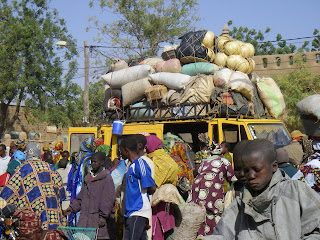
Watermelons, anyone?

The Djenné mosque on market day, saweet!

This dude tied my turban for me...we had plenty of time to hang out, because on that day, we waited for 8 HOURS for a 4x4 from a town called Mopti to Timbuktu (the 4x4 jeep never came, and we ended up taking a minibus, grr):
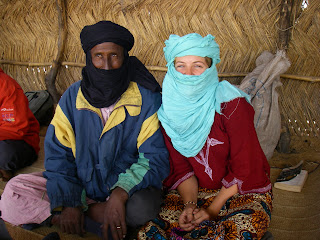
Good times on the bus from Bamako to a town called Segou (on the Niger river, very pretty) with a mango distributor and a mother of 8:
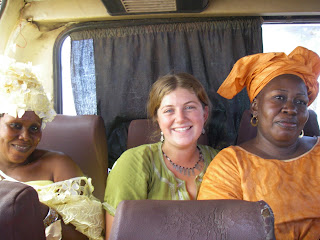
On the ferry crossing the Niger river near Timbuktu… wallai, I did not get into the story about the absurdly painful yet kinda fun minbus ride to Timbuktu, but long story short this picture was taken after a sleepless night spent in a minibus with 22other people…I have never been that close to having a panic attack than I was at 4 in the morning in an overheated bus with a billion peoples' limbs jabbing me every which way.

The Festival stage from a nearby dune:

Camels blocking the view of a traditional camel dance/ Tuareg drum circle called the tende…it was cool to watch once I edged in, trust me:

Me chilling on a sand dune at the Festival:

My friend Dillon and I in Dogon country:

This is a traditional courthouse in Dogon country. The roof is low to prevent people from standing up quickly in anger and storming out ... a good way to remind people to have patience and not blow their lids!
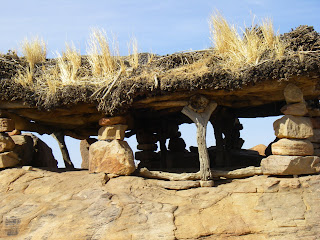
Oh, the irony! A "Tuareg" siting in Bamako!
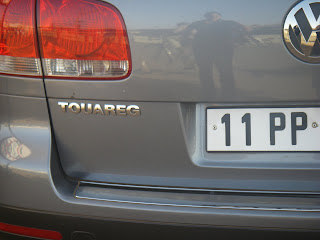
Fun Fulani hats and scarves for sale:

Enough said!



















